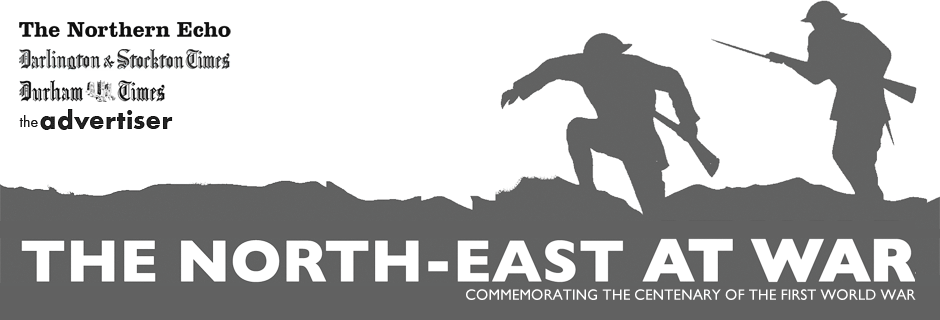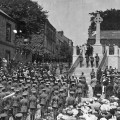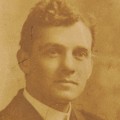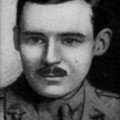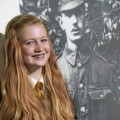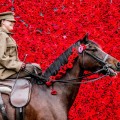Romantic, caring, both brave and afraid… the wartime experiences of a County Durham soldier are revealed through a series of treasured postcards – many sent home from the Somme. Chris Lloyd tells Private Abraham Stewart’s story.
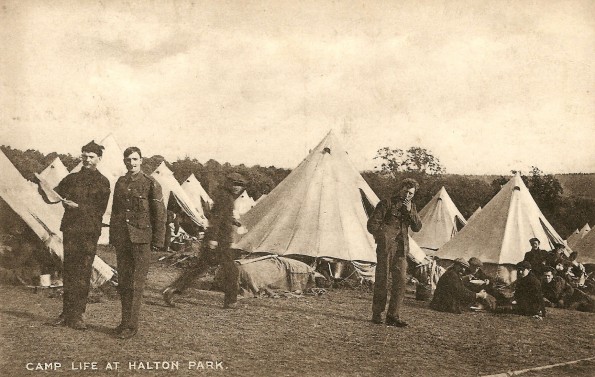
GETTING READY FOR WAR: November 7, 1914. A postcard showing the Halton Camp training camp – Abe is complaining about his lack of tobacco
UNDER a floorboard in a Darlington house, the relatives of Pte Abraham Stewart keep on old sturdy cardboard box that had once contained six dozen ha’penny Elysian custard toffee tablets.
The custard toffee tablets are long gone. Instead, in the box are a couple of hundred postcards that tell the story, in snatches, of an ordinary County Durham miner’s war.
They tell a story that thousands of other ordinary men could have told: signed up in 1914 to serve king and country, long and tedious training in camps in the south, and then brief and bloody action on the Western Front. Abe, as he signed his cards, was wounded three times, and the custard toffee box includes a field service postcard providing the official notification that he had been shot through the right knee on the Somme in July 1916.
More than anything, the postcards tell Abe’s love story. He left his girl, who was also from a family of miners, back in Ferryhill. The postcards reveal how he misses her, how he worries about her, how he loves her and how, eventually, he becomes a father.
And this love story has a happy ending. Abe recovers three times in hospital, but safely finishes his fourth trip to the frontline, and makes it home to wife and new baby, whom he has splattered with inky kisses from afar on his postcards.
The story is told in his spidery handwriting, and it is incomplete – months of postcards are missing, and the longer letters that once accompanied them are no more.
But the postcards that survive are like a modern day Facebook post or a tweet on Twitter – they are a momentary fragment of what life was like 100 years ago. They transport you to a specific second of the First World War.
Here’s how the extraordinary story of Abe’s ordinary war unfolds:
1912-14
Abe Stewart is a miner living with his mother in 3rd Street North in Easington Colliery. His girl is Eva Bailey who lives with her family of Windlestone miners in Darlington Road, Chilton Buildings, near Ferryhill (occasionally, he addresses postcards to her full name: Evelyn May Bailey).
“Sunderland is going to win the cup”, he writes on the first surviving card. A little later, he puts as a PS: “Middlesbrough’s no good this year, Eva”. Football was clearly important even 100 years ago.
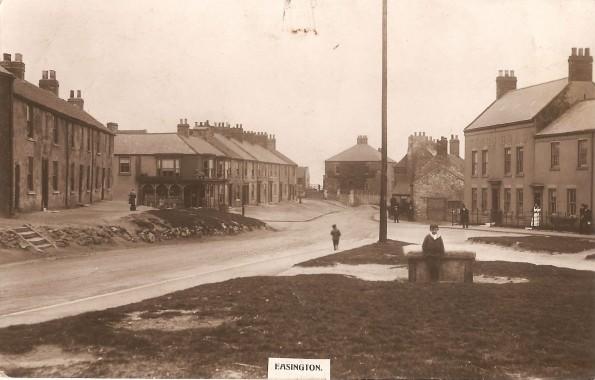
February 7, 1913: From Abe in Easington Colliery, where he worked as a miner
Feb 23, 1913
“What do you think about Easington? Now mother says you are not to be too long in coming to see us again. She did not expect you were going to go home so soon.”
Is this the first time he has taken Eva home to meet his mother? On his birthday, March 29, 1913, he writes that the last year has been “so bright and clear” because of their relationship, and by the middle of 1914, he is well and truly smitten. Separated by 20 miles, he writes: “I would be alright if you were by my side darling for I am so lonely without you…but the time is coming nigh when I see your sweet face again, love. I would like it to be now so that I could kiss your sweet lips it is so long since I had a kiss from you, dear, and one from you would be worth a lot to me now. I wish I had you on my knee the same as on this card for you are the world to me, darling…”
Britain officially went to war with Germany on August 4, 1914. Abe appears to have joined up almost immediately, probably initially the Northumberland Fusiliers, and was sent with thousands of other volunteers to a training camp in the south.
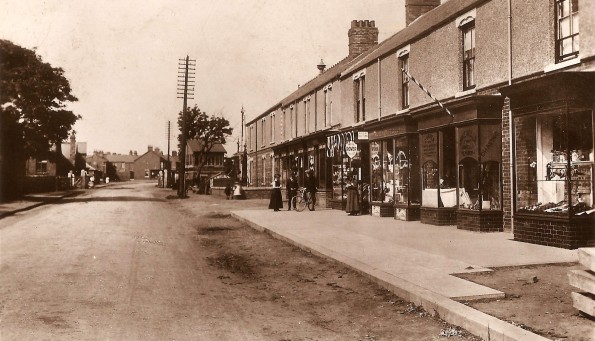
February 6, 1913: Eva sent this card of her home in Ferryhill to Abe in Easington Colliery
Oct 4, 1914
“We marched to the station for our guns today and then we marched round Lord Rothschild’s grounds and Castle and it is a beautiful sight to see I can tell you, you want to be here to see hares and pheasants, you cannot get walked for them there is that many.”
Abe has arrived at Halton Park near Aylesbury in Buckinghamshire, a large country estate given to the war effort by banker Alfred de Rothschild. He appears to have just got married – addressing Eva “dear wife” – and has been transferred to the 8th East Yorkshire Regiment, which had just been raised at Beverley. There is no obvious reason for him to join the 8th, other than the need to fill up numbers, although the 4th East Yorkshires had begun their training in the grounds of the Hummersknott mansion in Darlington, so he could have had a local affinity.
Oct 11, 1914
“I was at church parade this morning and it was a treat. There was 4 generals at the service and I heard what I never heard before – about 78 thousand voices singing hymns and in prayer. It would have done you good to have seen them, dear, all lined in a great big field with a preacher in the middle.”
Nov 1, 1914
“I will be going out to church in a few minutes dear so you will see that I have turned good again. I never look at the pubs now, dear, I have turned against them for ever this time dear. No more for Abe.”
Nov 7, 1914
“My shag baccy is done dear, and I cannot get any of that sort here, so don’t forget it dear the next time you send a parcel.”
Undated
“Send me a pair of little siccores as I do badly without any for you know I have to play the woman’s part now as well dear as I have not got you or mother to do my mending now, but I wish I had all the same.”
As this card suggests, although Abe’s handwriting in his black fountain pen is quite neat, his spelling is not always correct, and almost every bit of punctuation has had to be added as he didn’t bother with commas and full stops.
Undated
“I will not have very much to say as there is a line or two on the other side for you so I cannot put much more to it…I am ever thinking of how you are getting on, I only hope that you are alright happy and well and never trouble about me dear for I am not taking any hurt, but it is a long way to Chilton Buidlings, Eva.”
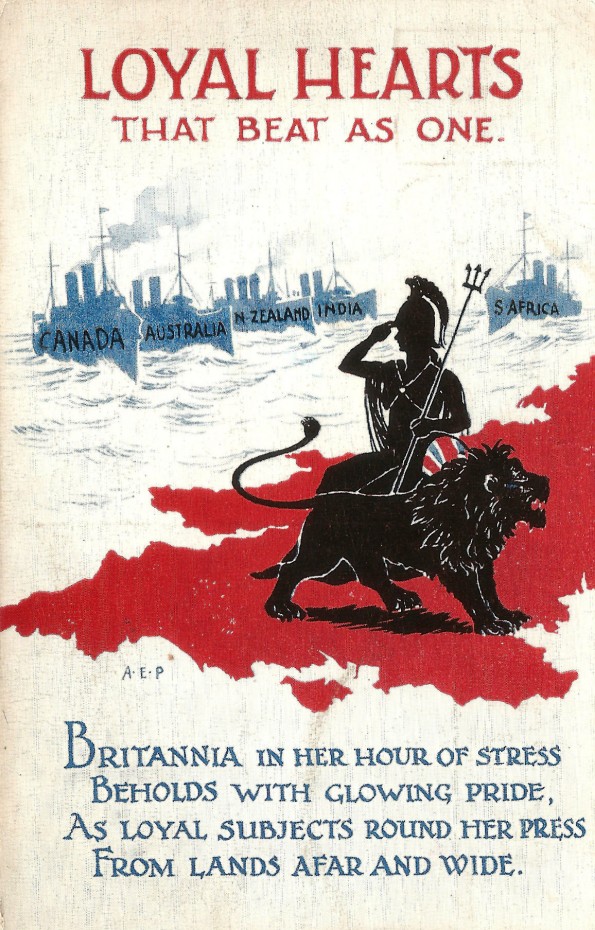
December 1, 1914: A patriotic card from Aylesbury – but Abe fears German spies are in the camp
Dec 1, 1914
“Leave cancelled. They think there is some more German spies here for the Captain has told us all that if anyone asks us any news about how many men there is here we have not to speak.”
Jan 20, 1915
“I see there has been another raid at Yarmouth, so I think they are determined to wreck England if they get half a chance.”
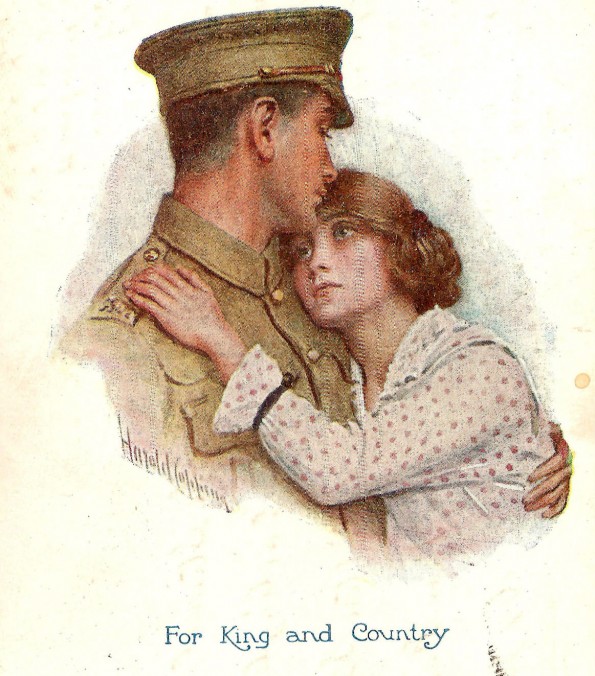
ROMANTIC: May 15, 1915. Abe is in Halton Park Camp, near Aylesbury
May 1915
“We have been out for a very long march today that nearly everybody is a cripple tonight, what with sore feet and others skinned – it is torture here, it is slow poison for the troops down here but we will get over all that someday I hope.”
Abe’s cards have become increasingly hurried: he’s spending long hours at the rifle range and then taking part in long route marches. However, he’s splattering his cards with kisses.
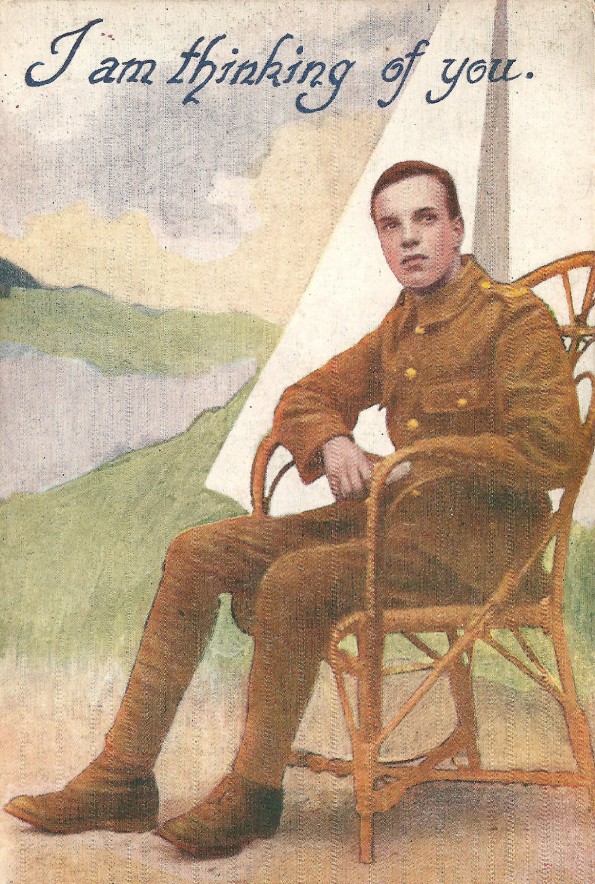
May 1, 1915. Abe is in Halton Park Camp, near Aylesbury. It was among many First World War postcards, from Abe Stewart to his wife, Eva, in Chilton Buildings, Ferryhill
Undated
“They have been around seeking the ones that have not been noctulated so as to have them done but I don’t think they will get Abe to be done, oh no.”
Aug 11, 1915
“The king and queen are going to review us in the morning at Windsor, and there is a big camp of German prisoners here – I do wish I could get at them for a few minutes.”
Abe has spent much of the last year under canvas around Aylesbury in Buckinghamshire, but here he is writing three miles from Windsor. The long training marches, the injections and the royal inspection are all precursors to being sent to the front – in fact, all Britain knew about the forthcoming secret “Big Push”, so the Germans must also have known.
On September 9, 1915, the 8th East Yorkshires landed in Boulogne, and spent the next 12 days on long route marches across 75 miles to Loos where, on September 25, Britain’s first large scale attack began. It was a classic trench assault: days of bombardment followed by thousands of men being thrown at the enemy defences, although it is also noteworthy for being the first time the British had used gas.
Abe and the 8th East Yorks spent the night before the battle soaking in the rain and sleepless in a bivouac. Their mood lightened a little in the morning as they smelled their midday meal cooking, but before it could be served, they were sent to plug a gap at Hill 70. This was Abe’s first taste of battle. In the two days that the 8th were in the frontline, 26 men were killed, 143 were wounded, 133 were missing and one was suffering from the effects of gas.
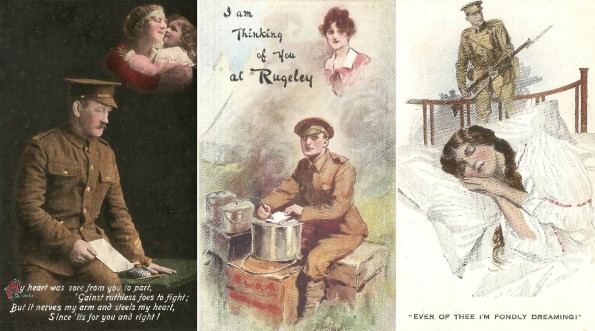
THINKING OF YOU: Some of the First World War postcards from Abe Stewart to his wife, Eva
Oct 7, 1915
“You know we have not to put too much in about the fun we have had lately so we will have to leave that for some night when I come home again.”
Censorship prevented Abe from saying too much, but this was his first silk postcard to Chilton – these fancies were usually handmade by French women and sold to soldiers who, without a mobile phone, were desperate to get a message to loved ones.
Undated “Dear wife, just a line to you hoping that this will find you quite well and happy as it leaves me not so very well this morning for you know I was wounded in the big battle yesterday so I have only one arm today, so it is a bit hard lines, what do you say, dear. Well, Eva, I looked for you and mother to come with a bucket of water yesterday but you never came so I am going to give you both the sack.”
The Battle of Loos fizzled out on October 15, by which time the 8th East Yorks had lost 320 men. Abe was obviously one of them, and his last card from France is dated October 29.
Jan 12, 1916
The correspondence recommences with Abe at Rugeley Camp in Staffordshire. His regiment has remained on the Western Front, but he is recuperating – he’s obviously not too bad as he says a football injury has caused his ankle to swell so he can’t get his boot on. He was probably training become a member of the new Machine Gun Corps which was to be attached to every infantry battalion.
April 5, 1916
“Sorry that you are so unhappy but cheer up – they will never find where you live so don’t be afraid. I don’t see where they will trouble Chilton if they were to pass it.”
Eva was worried about the Zeppelin threat to the East Coast – ironically, the very night after Abe wrote these consoling words, a Zeppelin practically flew over Eva’s house and dropped its bombs on the Dene Valley.
April 29, 1916
“Well my dear this will be the last time I write to you from England for a bit. The next will be from France as I am leaving at half past 5 tonight… well, we are leaving some splendid fine weather here just now so I hope that I will keep like this and will not be so bad in the trenches. Well my dear I will have to close now and say goodbye to you all for the present so goodnight and may God bless you all till we meet again I still remain your every loving Husband Abe, xxxxx.”
April 30, 1916
From Folkestone: “We will be on the water in a few minutes.”
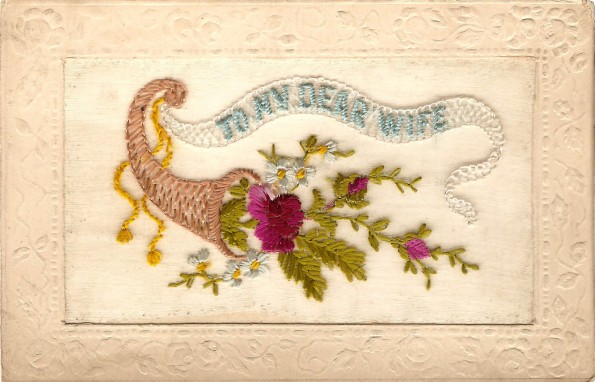
May 10, 1916: A silk postcard, probably handmade by French peasants who lived near the frontline, sent to Chilton
May 10, 1916
“I have got up among the boys at last and it is terrible wet here it has rained very heavy this last 2 days and things still look very busy here yet. Tell George that they are still throwing the oil bottles over here. Things are humming now. It is lively now.”
This is the first silk card of Abe’s second trip to France. With his new machine gunning skills, he has rejoined the 8th which is now in northern France.
June 24, 1916
“Having so rough a time of it, but I am very glad to tell you that I have got out of it alright again. We are just busy looking for a tidy billet now.”
This is an elaborate card entitled “A kiss” with a ribbon. Abe sent a similar card home but didn’t date it. It is entitled “A letter from France” and contained a poem by A Loughton: When the rain is pattering on us And the shells do shriek above Even then with all my heart’s force Do I think of you, dear love… For when fog is gathering round me, And the shells above us shriek Then of you my heart is thinking – You so fond and sweet and meek!
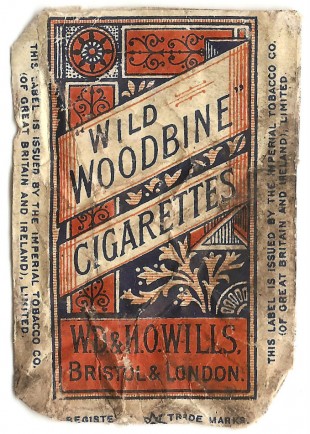
COMFORT: Every soldier needs something to light up – Abe’s packet of woodbines
July 5, 1916
“I have covered some miles of France this last fortnight and we are ready for doing another 12 or 14 mile tonight. The Huns are taking some keeping up to now they are going back dammed fast. Things are humming now. I cannot half step it out now. One of our chaps run about 4 miles the other night with two Huns on the end of his bayonet and when I stopped him and told him about them he said he never knew that they were there. Anyhow, so now things will look bright after a little bit more struggle. Well dear I see that the East Yorks are mentioned in the dispatches for their gallant work in the field that will be another feather in the flag for us but they can keep all the honours for Abe. If it was only over. My honour is at home when I get back to it.”
The 8th are marching south to the Somme…
July 17, 1916
A standard field service postcard sent from Rouen reveals Abe has a “bullet through the right knee”. The 8th joined the Battle of the Somme on July 14, at Bazentin Ridge, going over the top at 3.25am. The preceding bombardment had killed some of its own East Yorkshire men and hadn’t destroyed the German zigzag barbed wire. Two platoons from the 8th made it into the German trenches but were never heard of again. At 2pm, when the 8th were relieved, they had lost 89 killed, 229 wounded and 141 missing – Abe was among the 229.
July 24, 1916
“They will not let you send any matches by post but I need some badly. I don’t like keep asking every time I want a light and you did not send me anything to get any matches with or the nurse would have bought some for me.”
Abe is recovering in Stanhope Mess in Aldershot – and is after some essential supplies from home. Besides the postcards, the only other item in the Elysian Custard Toffee tablets box is a crumpled, and empty, packet of Woodbine cigarettes.
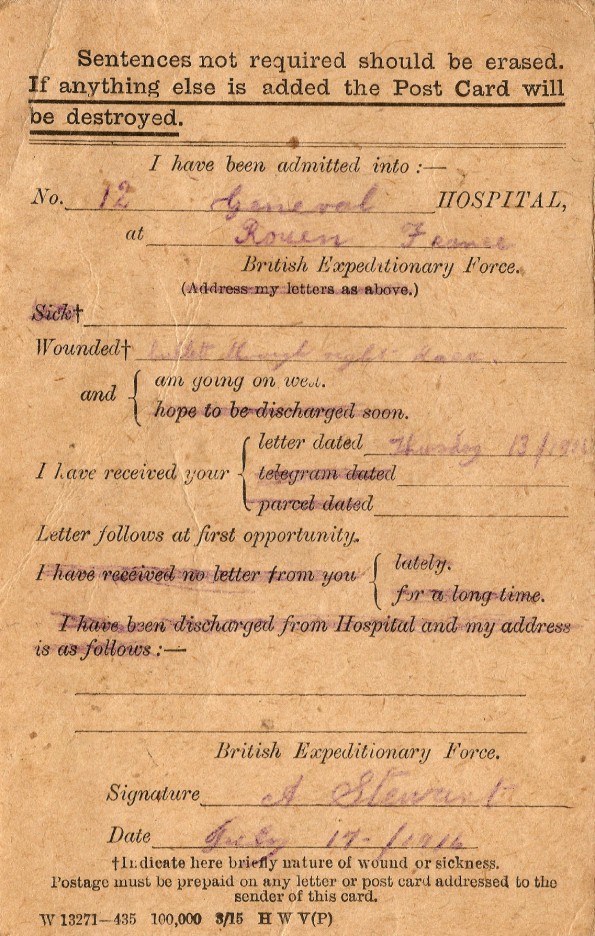
WOUNDED: July 17, 1916: The official notification that Abe had been shot through the knee on the Somme
July 27, 1916
“I am sending you this card to let you know that I am leaving here today but I cannot say for sure where I will land so don’t write any more until you hear from me.”
Abe is moving on from Aldershot. The postcards are becoming patchy.
Dec 4, 1916
“I have been travelling all day until now, I am at Hull tonight. I have come on escort to get a prisoner here. They locked him up in Hull so I was sent for and I will be going back in the morning with him.”
Abe has recovered sufficiently from his injury on the Somme to do light work for the 8th. The battalion remained near the Somme, fighting near Arras in April 1917, and in the autumn they were sent by train to Flanders where, on September 20, 1917, they were thrown into the Battle of the Menin Road Ridge, near Ypres. The regimental history says that they endured three days of hell on the frontline at Zonnebeke before being relieved on September 29. Abe must have been among them.
Oct 25, 1917
“I am sending you a card to let you see part of the place I am at. It is pretty good but not up to the place I left although we are allowed out more. This is a big hotel taken for a hospital. It is three-storey. I am on the top floor and have a pretty view of the place.”
Abe is hospitalised once more, this time in Barry, in north Wales, presumably due to an injury received in Flanders.
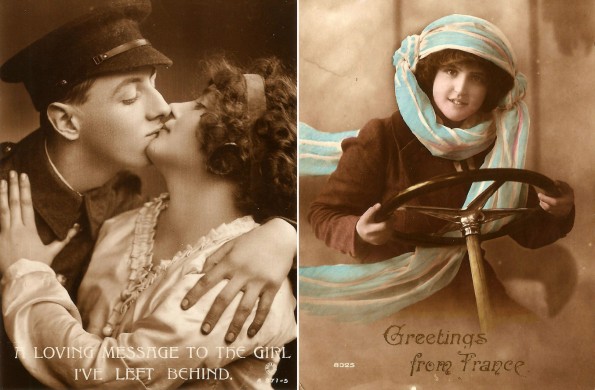
Left, an undated smoochy card in which Abe tells Eva of his fears of being ‘nocculated’. Right, Greetings from France, where attractive-looking women are doing men’s work at the wheel of a wagon
Nov 28, 1917
“I am sorry to hear the news of poor Joe Slater, poor lad, been killed, and you say there is also another chap that belongs Chilton. Well, it is a bit hard that so many poor chaps are going down now belonging to Windlestone and Chilton, but someone has to go.
“There was a chap took into our hospital yesterday. He had come from the front and he was simply riddled with bullet wounds poor chap. It was a pity for him.”
Jan 7, 1918
“I have had rather a busy day of it as I have been at it all day getting subscriptions among the chaps for matron’s present and I went and got a nice tea service. It is cost £4 4s 0d. It is a lovely thing so we’re going to give it to her on Wednesday afternoon. Well dear, I have filled my papers in today for home so we will not be long now I hope.”
Abe is still in Barry, but this is the first card to be addressed to “my wife and daughter” – Muriel was the first of their five children, presumably the result of a spell of home leave after Abe had recovered from the Somme injury and before he was despatched to Flanders.
May 14, 1918
“Getting on not so bad today only my arm is a bit sore and stiff as I had the needle into it yesterday but it is not half as bad today as what it was the last time I was home and got done.”
A birthday card, smothered in kisses for both baby and Eva. It seems as if Abe’s wish to leave hospital was premature. However, there are other postcards with 1918 postcards that show he was well enough to go to barracks at Beverley. Due to a lack of numbers, though, the 8th East Yorkshire battalion was disbanded on February 10, 1918, and those old soldiers, like Abe, who were still standing were sent to other divisions to fill up the ranks.
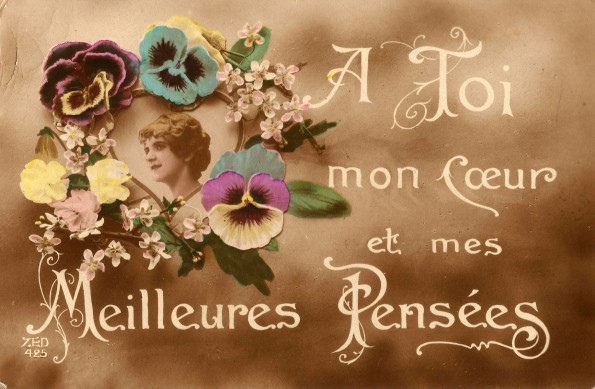
November 2, 1918: A last French postcard home, sent just nine days before the war ended
Nov 2, 1918
“I feel quite fine just now and everything is going quite well with me. I will ring off after wishing you all good night and may God bless you till we meet again. I still remain your ever loving Husband.”
Abe is back in France. His military records no longer exist – many First World War records were destroyed during the Blitz of the Second World War – but his fourth trip to the frontline was mercifully short, as the armistice was declared on November 11, 1918.
He was demobbed on January 19, 1919, and returned to the Windlestone area of Ferryhill, where he and Eva had four more children. Abe also returned to the mines, working as a joiner fashioning pit props – perhaps his physical condition prevented him from working at the coalface.
The final chapter in this ordinary story is that Abe and Eva died in the 1950s.
“I have only the vaguest of memories of him,” says his grandson, Keith Stewart, who keeps the postcards under the floorboards for safety.
Those cards tell a story of this most ordinary Durham miner who was injured three times on the Western Front, but all he complained about was his lack of tobacco and how he missed his woman back in Windlestone – truly extraordinary.
With many thanks to Keith for lending us the postcards, and to Joyce Malcolm and Tim Brown in Ferryhill for their research. More of the postcards will appear in Weekend Memories in The Northern Echo on future Saturdays.
